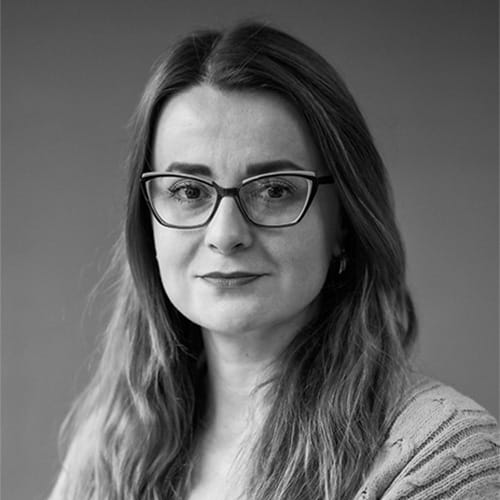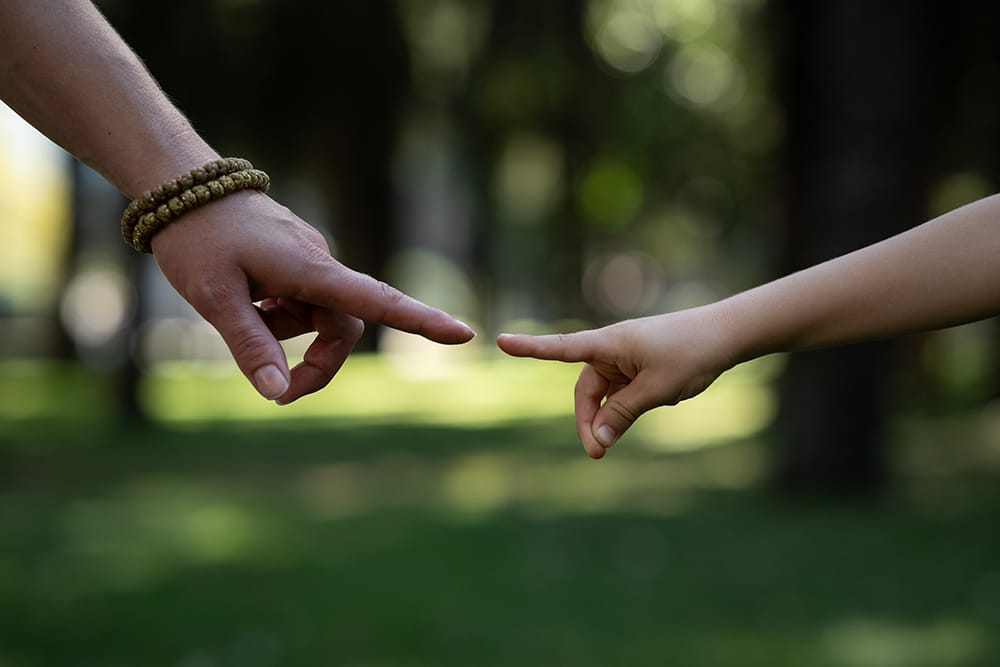David arrived at the Social Service Center in Banja Luka with his mother. Despite being just seven years old, he has lost count of how many times they have visited. It’s a stressful and confusing experience, but one he has grown accustomed to. The room is tense: everyone is arguing and talking over each other, but no one is addressing David, even though this concerns him the most. Some people have decided that he will now live with his dad, and they take him away from his mom abruptly and without warning. They tell him he must go right away and don’t ask him how he feels or if he is scared.
In 2020, the Banja Luka Social Services Center concluded that the mother had neglected David by leaving him with his grandmother, despite no evidence that it endangered the child. Following custody being granted to his father, David had to accompany him abroad. In the meantime, the court determined that it was better for the child to live with his mother.
The CIN’s research indicates that children whose parents struggle to find common ground after divorce often suffer from this trauma and are frequently subjected to improper procedures and inadequate engagement by social services in Bosnia and Herzegovina (BiH).
“This family issue is a black hole for us”, says Alma Lisica, director of the Social Service Center in Novi Travnik.
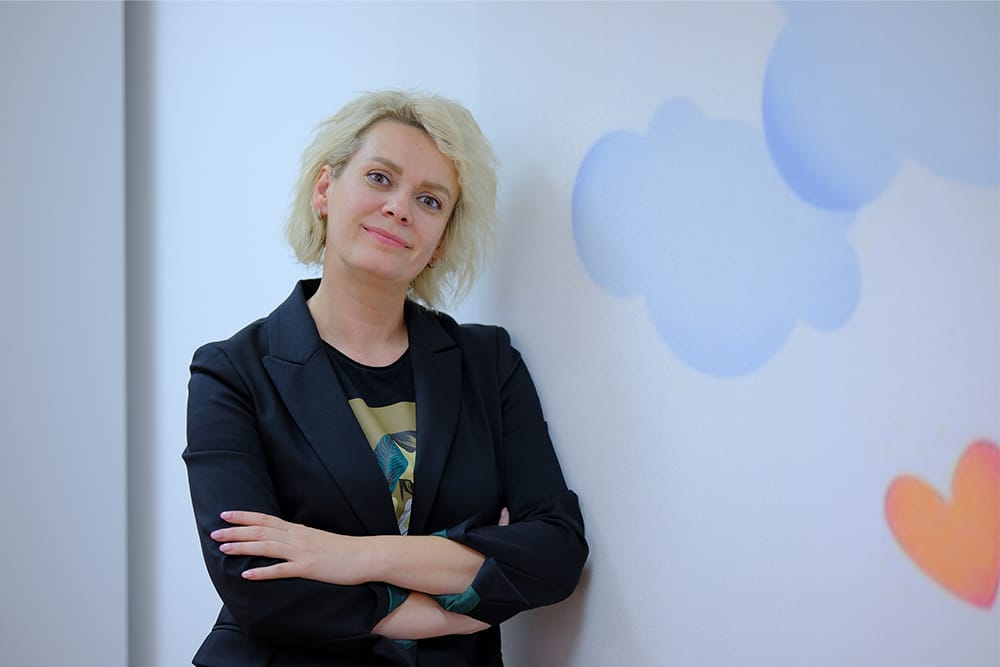
Faith Unchecked
David was ten months old when his parents Sanja and Milan separated. He was subsequently placed in his mother’s care, but the former partners disagreed regarding visitation and contact between the child and the father. The animosity was so intense that Milan was fined 700 BAM for threatening Sanja’s safety. He admitted to making death threats but denied physically assaulting her, as stated in the court’s ruling.
Several years later, their case was taken over by social worker Bojan Arula, who, in their first meeting, warned Sanja that he would remove the child if she obstructed contact with the father. Despite her assertions that she was not preventing contact, the Center sided more with the father.
The situation came to a head in March 2020 when a meeting at the Center turned into a nightmare. Sanja recalls Arula ordering her to bring the child within an hour or he would send the police to fetch him, and then informed them that David would live with his father from that moment on.
A month earlier, the Center’s expert team consisting of Arula, psychologist Mirela Koprivica, and lawyer Dajana Kapović, concluded that Sanja was neglecting her son by leaving him in the care of his grandmother. They argued that the grandmother’s behavior was detrimental to the child’s socio-emotional development and accused both Sanja and the grandmother of obstructing the child’s contact with his father.
They based their decision on findings from the school report noting occasional signs of withdrawal, egocentric speech, and immature behavior in the child. They also noted that the grandmother behaves inappropriately by overdressing the child, inhibiting his independence, excessively sheltering him, and speaking negatively about the father.
Arula interviewed the boy at school, with school psychologist Natali Sanković Marić present, and documented from the boy’s responses that he does not reside with his mother. In his notes, Arula emphasized that both he and the school psychologist agreed that this situation is unsustainable for the child, necessitating urgent measures to prioritize the child’s best interests.
However, Sanković Marić had a different perspective – she testified in court two years later that the child appeared confused and did not provide much information during their interview. She clarified that the school did not conclude that the child did not live with his mother, but rather that he spent more time with his grandmother due to his mother’s frequent absences. She emphasized that the boy was not neglected or unhappy in terms of upbringing, and there were no behavioral issues at school.
In addition to Arula’s report, the Center also took into account statements from unnamed neighbors of the family who claimed that the child lived solely with the “unstable grandmother” when making their decision.
“Even to this day, we do not know who these neighbors are, or if they are indeed neighbors”, says Sanja’s lawyer Bojana Duka Bubić, adding that because of this, their statements cannot be considered valid. The Center was obligated to record their details and summon them to provide official statements: “They should have, they had to do so if their goal was to establish the truth.”
Lawyer Duka Bubić contends that neglect was neither proven nor investigated and that the Center had no right to remove the child.
The Republika Srpska Children’s Ombudsman, Gordana Rajić, emphasizes that in such family situations, the initial steps should involve counseling or intensified supervision measures.
“It’s not the same if a child is left unsupervised at home if he does not attend school regularly, if he is malnourished or has health problems, or if he is left in the care of a third party”, Rajić explains.
Sanja’s lawyer further argues that besides the failures in identifying neglect, the Center also disregarded notification protocols regarding their decision: they notified her of the child’s removal on the spot, without providing the mandatory written notice that would have allowed her to contest allegations of neglect.
“At no point was the child left alone. Leaving a child implies going away, turning one’s back, and not being present. He means everything to me”, says Sanja, explaining that David spent more time with his grandmother for a while because she and her current husband were busy building their family home.
Meanwhile, social worker Arula had informed Milan about 20 days earlier that the child would be taken away from the mother: “(…) and if I don’t come to pick up the child, they will place him in a facility, and he will live there”, Milan confirmed in an interview with CIN.
Despite initially marking the child’s removal urgent, Arula agreed to wait for Milan to return from abroad.
Several days after the shock and fight on the premises of the Banja Luka Center, Milan took David abroad.
“This should have happened much earlier. It took them too long to confirm what I had been saying, that the child needed to be removed because he wasn’t living with his mother”, Milan remarked.
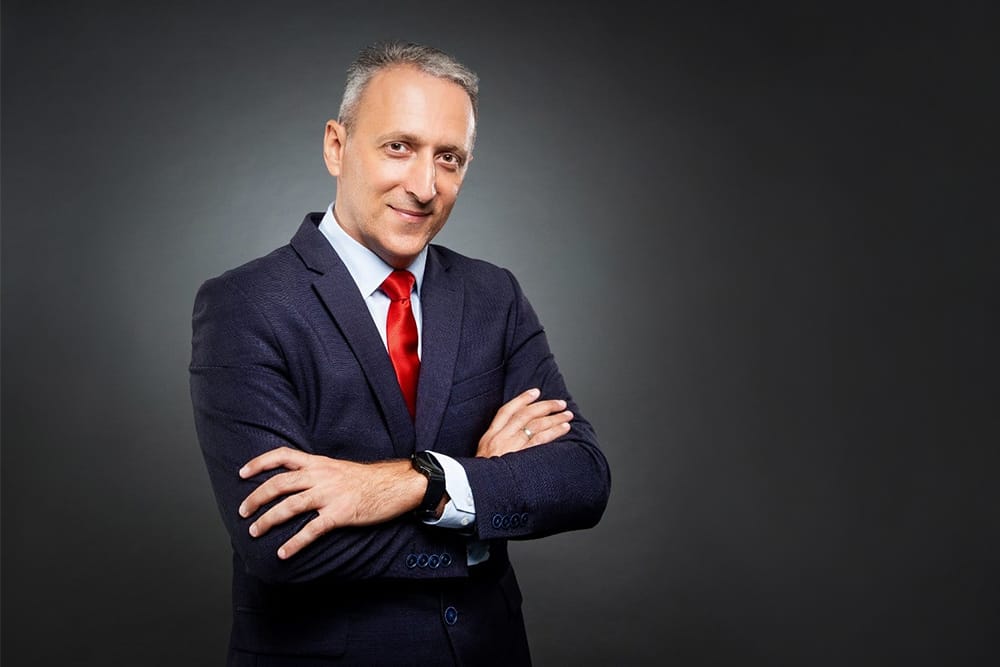
Sanja appealed the Center’s decision to the Ministry of Health and Social Protection of Republika Srpska. Her appeal was dismissed as unfounded, with the Ministry asserting that the Center had convinced them that the mother had compromised the child’s best interests by leaving him in the care of his grandmother.
Sanja then sued the Ministry in the Banja Luka District Court. The lawsuit was also dismissed as unfounded, with the court stating that the facts had been correctly established and that the actions taken were in accordance with their authority and in the child’s best interest. She attempted to contest the ruling at the Supreme Court of RS and the Constitutional Court of BiH. Both courts rejected her appeals, stating that the judgment was correct and legally sound.
“If you stay silent, follow the law, you’ll get nowhere”, says Sanja, reiterating that she was denied the opportunity to prove that she had not neglected her child.
BiH Human Rights Ombudsman, Jasminka Džumhur, notes that courts place great trust in social service centers, believing them to be impartial and expert bodies. However, this does not exempt the court from its duty to use its authority to investigate any doubts.
“The party must be heard. If the mother was not given the opportunity to present her case during the proceedings, it constitutes a significant procedural violation.”
The RS Ombudsman for Children also wrote in her opinion that the child was taken from the mother without an explanation as to why this was in the child’s best interest. She emphasized that separating a child from a parent is a repressive measure that should only be applied when it is clearly in the child’s best interest.
“The child went to live with his father in another country, changing his school, language, environment, and peers… yet no relevant authority checked the circumstances of the father’s living conditions or his ability to care for the child,” the opinion states.
The Banja Luka Center explained to CIN that in the case of placing minors with another parent, they first examine whether that person is suitable to take care of the child. According to what Milan told CIN, the Banja Luka Center did not verify the conditions in which the child would live abroad with his father. However, workers from the local social service there did visit them.
Milan then filed a lawsuit against his ex-wife in the Banja Luka Basic Court, seeking long-term custody of the child. Due to this, he withdrew the identical request he had previously submitted to the Center, and the Court concluded that the decision to temporarily place the child with him was no longer valid.
“The decision granting custody of the child to the mother remains in effect”, states the April 2024 ruling, which rejected Milan’s request for long-term custody, as the Court believes the child should be with the mother.
Sanja and her new husband have moved to the same city where her child lives with his father, and she is waiting for the court’s decision to become final. She hopes that her child will be returned to her. Milan has appealed the verdict.
Bojan Arula is no longer an employee of the Banja Luka Social Services Center. He now lives and works in Germany and refused to discuss the matter. He claims that he does not remember the case and cannot talk about it since he no longer works at the Center. Even his former colleagues were unwilling to speak about this, citing the obligation to protect the minor child, but they explained that a child is removed from the family when there is an immediate threat to their life and health.
Of the 16 recommendations that the RS Ombudsman for Children issued to social service centers from 2019 to 2022 due to complaints about their actions, five were issued to the Banja Luka Center. The recommendations pertained to children’s contact with parents they do not live with, children’s right to protection from violence and neglect, and the right of children in social need to be placed in an institution.
In this center, there are 10 educators, 11 psychologists, 15 lawyers, and 40 social workers – each responsible for up to 50 cases.
Double Standards at the Banja Luka Center
In the case of another family, the Banja Luka Social Service Center took no action beyond counseling the divorced parents, despite years of reports about their children’s endangerment. Both the mother and father had reached out to the Center for years, and the issues escalated to accusations of physical and sexual abuse of the children.
Following their 2010 divorce, the three minor children were placed in the care of their father, Dragan. While the younger children, Andrej and Maja, spent weekends with their mother, Jelena, the eldest, Saša, refused contact with her, claiming she had beaten him.
The problems became more serious as the children grew older. Since 2015, Dragan and Jelena have repeatedly complained to the Center about each other. Dragan claimed that Jelena behaved irresponsibly when the children were with her, leaving them unsupervised, while Jelena accused her ex-husband of mistreating the children and preventing her from seeing them.
The school reported to the Center that, based on their conversations, the children appeared to be “deeply involved in the problems and disputes of the adults”.
That same year, Jelena turned to the Institution of the Human Rights Ombudsman of Bosnia and Herzegovina due to difficulties in maintaining contact with her children, issues she had also reported to the Center. The Institution warned the Center that the children were being subjected to emotional abuse and requested an investigation to ascertain the true situation. The Center responded, acknowledging problems in the mother’s contact with the children and stated that they had advised the parents to adhere to the agreed contact arrangements.
However, the Center did not take any concrete action.
Six years later, Andrej confided in his school counselor that his father was violent towards him and his sister.
“(…) Andrej claims that his (father, author’s note) behaves badly towards him and his sister, often directing hurtful words at them, belittling them, and threatening them, especially if they mention wanting to live with their mother. Andrej mentioned that their father used to punish them physically but now mainly verbally abuses them. “Andrej says that their father threatened to kill them if they reported his behavior to the police or the Center”, wrote school counselor Snježana Dodig in an official note.
The children retracted these statements when the school notified the Center and the police. Andrej told CIN they did so because their father threatened to put them in wheelchairs if they reported him.
The Center then, at the request of the police, wrote a report stating that since the parents’ divorce, the children have been involved in conflict situations. They concluded by stating that they plan to continue monitoring the family and use advice to try to prevent violence.
In December 2022, Andrej moved in with his mother. He claims his father kicked him out, but he had been eagerly anticipating that day because he couldn’t bear the psychological and physical abuse anymore: “Every day, he was hitting me. Every day, at least a slap or something. Every day, there was some form of violence. Continuously for years.”
He and his mother reported it to the police. According to official records, the Center subsequently visited the former spouses twice and talked to the children. Again, they concluded that the children were suffering due to parental conflict, but did nothing further. Andrej even claims he never saw them visit his father’s house.
The Center informed CIN that in cases of severe and prolonged endangerment to children’s development, they implement increased monitoring of parental rights, but they did not do so in this instance.
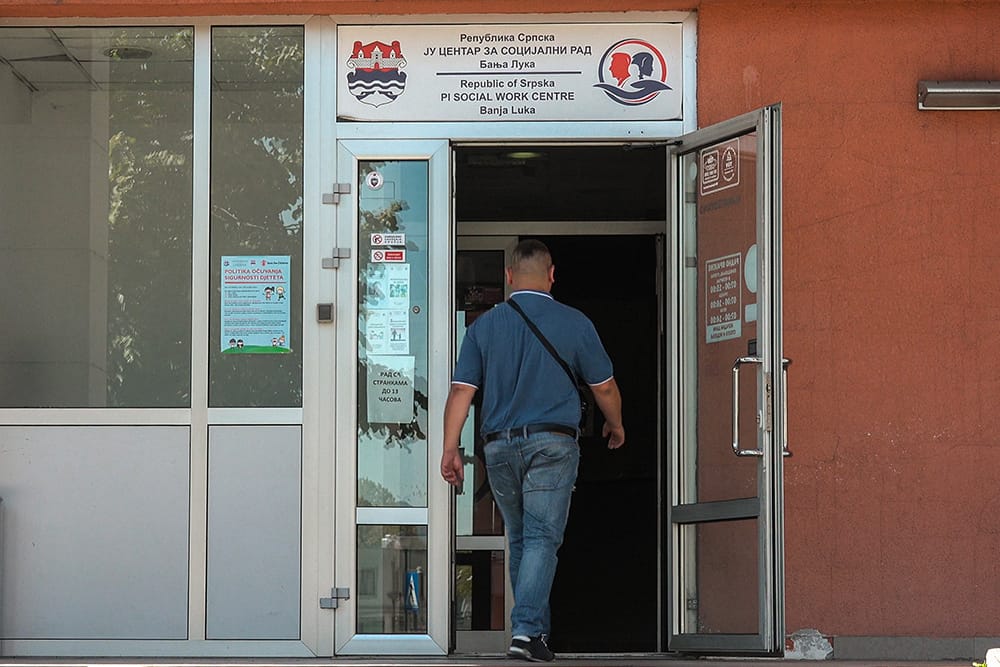
Not long after her brother, Maja also moved in with her mother. Jelena reported that her ex-husband and stepmother had been mistreating their girl. Concerns about her mental well-being had previously been raised by school pedagogical counselor Dodig, who urged the Social Service Center to take actions that would ensure the children’s welfare and “involve activities beyond mere conversations.”
However, more shocking revelations followed: the children accused their older brother of sexual abuse. Jelena reported her ex-husband to the police for physical violence and her son Saša for sexually abusing his siblings. After questioning, Dragan was released, while Saša was placed in custody. In May 2024, he was acquitted by a first-instance judgment because there was no evidence of crime.
“Things that happened to my children happened with the blessing of the Social Service Center. I blame them. They are 100% responsible because they didn’t react”, says Jelena.
Andrej also believes the Center had a duty to help them, and their family’s life could have been different if they had acted in time: “If they had just investigated properly and taken us away from my father, things could have been different. And I wouldn’t have gone through this. Not just me, but also my brother and sister. I just wonder how many cases like ours are out there. How many? I know I’m not alone.
Despite serious allegations and the traumas suffered by the children in this family, the Social Service Center Banja Luka declined to provide information on this case, citing the protection of their interests.
Neither Dragan nor Saša wanted to officially speak with CIN journalists.
The problems in these families persist: Saša is suing his mother for over 10,000 BAM owed in child support, while she claims she has already paid it. They still do not communicate.
Jelena has requested custody of her minor daughter, while Dragan claims she influenced the children to report him for abuse. Andrej and Maja are not in contact with their father and older brother.
The main task of the 112 social service centers in Bosnia and Herzegovina in such cases is to act in the best interests of the children and to arrange relationships until the court makes a final decision. They must understand family situations and relationships to correctly and persuasively recommend to the courts which parent would be better for the child. Their task also includes monitoring whether the chosen parent is properly caring for the child and whether other agreements and court decisions are being complied with. The centers often fail to do so, according to the ombudsman’s report.
Moreover, social service centers fail to explain in their decisions why a particular course of action is deemed best for a child in a given situation or the criteria upon which their assessments are based, despite being legally obligated to do so. Furthermore, children are frequently denied the opportunity to voice their opinions, and without their input, their best interests are called into question.
Alma Lisica, director of the Novi Travnik Social Service Center describes the social protection area as a “shadow realm” within society, devoid of oversight or scrutiny.
“I believe that the prevalent passivity stems from people (employees, author’s note) feeling embittered, having never received governmental support. Look, on one hand, there is a lack of human resources, while on the other hand, there are highly sensitive situations and cases where individuals are focused on self-preservation, thinking, ‘Let me just earn my salary.’
So, we lack oversight, we lack inspection”, says Lisica.
According to information CIN received from basic and municipal courts, they handled at least 4,500 cases over seven years involving child custody decisions during divorces. In most instances, they upheld recommendations from social service centers.
The child in “the crossfire”
The social service centers in Bileća and Trebinje are also “observing”, while a six-year-old boy is at the heart of the parental conflict.
Following Nevena and Miloš’s divorce in 2021, their son Stefan continued to reside with his mother. He visits his father once a week under the supervision of social workers.
Contact is restricted due to ongoing issues between the ex-spouses. This relationship has historically been fraught and complex, culminating previously in a case of domestic violence that led to Miloš being fined in 2019 after admitting guilt.
Nevena had previously reported him for neglect and violence against the child, asserting that the child refused contact with the father, but was pressured into it by employees of the Social Service Center in Bileća. She accused her ex-husband and his sister of sexually abusing the child and having an incestuous relationship, alleging that the child behaved violently and inappropriately after visits with the father, leading her to take the child for examination at the Psychiatric Clinic in Banja Luka.
Nevena moved with her son to Trebinje but continued to report her ex-husband to the local Center there.
“Every such report she made and every reason she cited for why the father cannot have contact with the child has proven unfounded, says Miloš’s lawyer, Zoran Ignjatić.
The District Public Prosecutor’s Office in Trebinje issued an order that no investigation would be conducted against Miloš as there was no evidence that he had committed a criminal offense. Miloš then sued Nevena for false reporting, but the lawsuit was dismissed.
In 2022, Miloš complained to the RS Ombudsman for Children that Nevena was obstructing his contact with the child. The Ombudsman cautioned the Social Service Center in Bileća that it is obligated to utilize all available measures to prevent the mother from obstructing contact.
“They have legal measures they should employ to address this situation, such as overseeing the exercise of parental rights”, explained Miloš’s lawyer. He emphasized that these measures include ongoing supervision and, in extreme cases, the withdrawal of parental rights.
Miloš filed a lawsuit seeking custody of the child, with both centers recommending to the court that the child should live with the father because the child feels comfortable in his presence, and he is cooperative and aware of both parents’ roles in the child’s life. Yet, the District Court in Trebinje ruled that things remain unchanged.
Due to her failure to honor the father-son contacts from October 2021 to April 2023, Nevena was charged with the criminal offense of child abduction, leading to a conditional prison sentence following a first-instance verdict in February 2024, which she appealed.
The centers in Trebinje and Bileća declined to discuss or provide information on this case, citing family protection.
They claim they receive one or two complaints annually regarding the work of professional workers in these cases: “ One party, dissatisfied with the decision or findings and the opinion of the guardianship authority, accuses the professional staff or one of them of bias, lack of objectivity, incorrect application of material evidence, etc.”
The Center employs 6 social workers, 4 psychologists, 3 lawyers, and two educators, handling up to 30 proceedings annually to protect the interests of children after divorce.
Jasminka Džumhur, the Human Rights Ombudsman of BiH, believes that the centers do not adequately address issues arising from contentious divorces, largely due to a lack of professional staff and outdated systems and practices in relation to current life circumstances—divorces are increasing and becoming more contentious. “We are sometimes shocked by the extent to which a parent can jeopardize their child’s rights”.
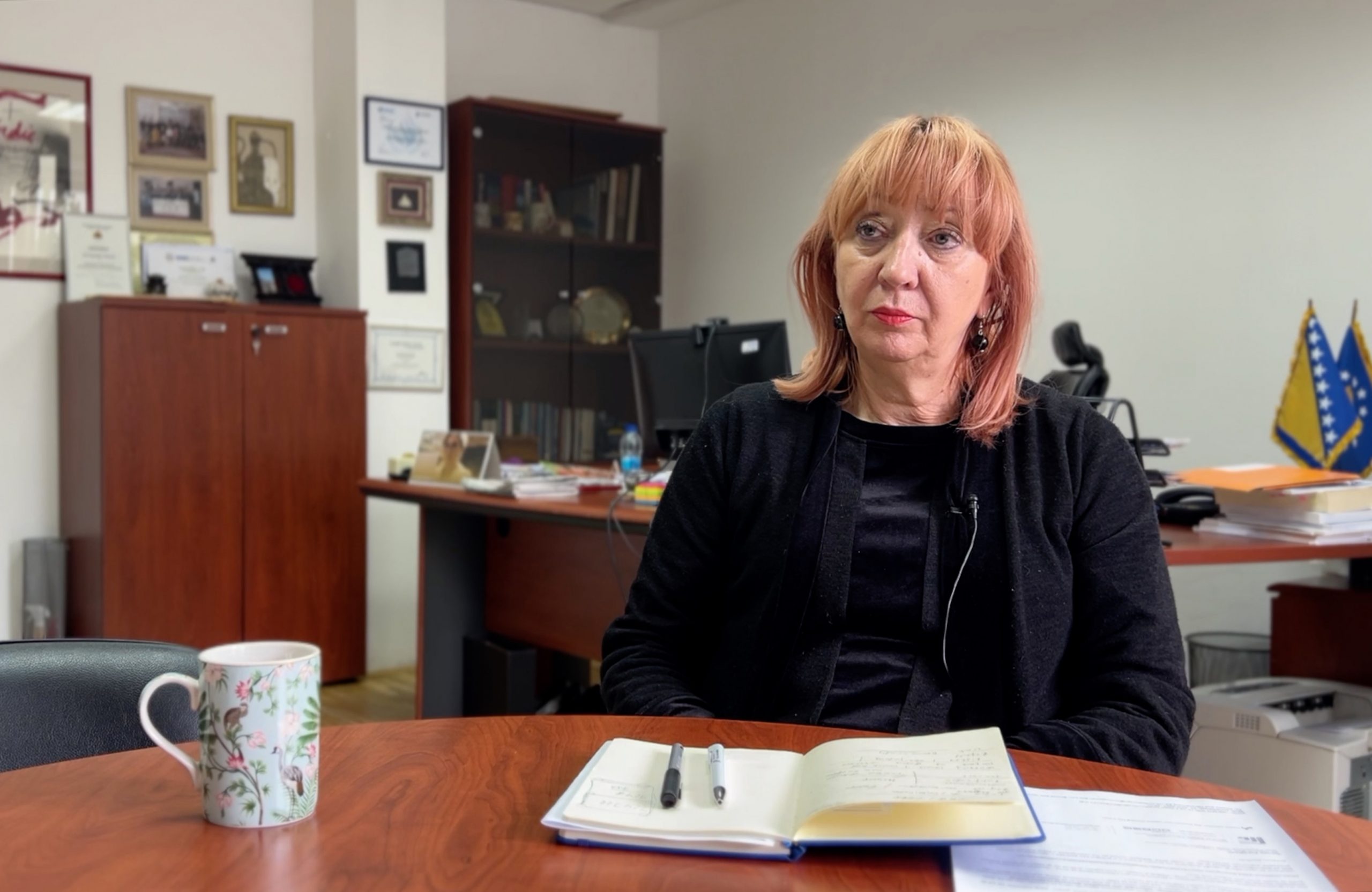
Reports received by the Ombudsman for Children of Republika Srpska mostly concern dissatisfaction with the work of authorities, distrust in their operations, and professional assessments. The majority of these reports involve issues regarding the maintenance of personal contact between a child and a non-resident parent after the dissolution of marriage or cohabitation: “Unfortunately, practice shows that there is no effective protection for the child in these procedures.” Issues in the work of competent services, unfortunately, have been recurring for years.”
Over the past seven years, around 140 complaints have been received at the addresses of social service centers, as reported to CIN, yet in none of these cases have the centers identified any errors by their staff.
Although the Federation Ministry of Labor and Social Policy’s website states that they are responsible for overseeing the professional work of social service institutions and acting as an appellate body for resolving family issues, the ministry consistently denies this assertion.
“The easiest thing is to shift the ball to someone else’s court”, says director Lisica.
According to data from the Agency for Statistics of Bosnia and Herzegovina in 2022, 1,776 employees were working in 112 social service centers and offices in Bosnia and Herzegovina: 584 social workers, 84 pedagogues, and 128 psychologists. At the same time, 42,772 minors were at risk due to their family situations.
Detailed information about the centers is not easily accessible to the public, despite being public institutions, and their disclosure depends solely on the goodwill of the centers, which is often lacking. On the websites of the relevant entity ministries, it is only possible to find directories, often containing inaccurate information. For other issues, they claim they are not responsible or invoke child protection and interests.
Citizens are unsure whom they can turn to for their rights, so they mainly complain about the centers’ work to ombudsmen whose recommendations are not binding.


